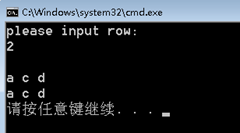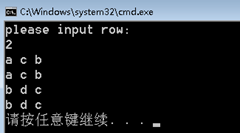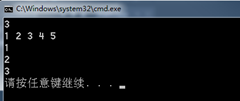C++输入问题探究
突发奇想对C++输入输出做一点研究,主要是做笔试题自己写输入老是花很多时间,所以做一个总结。
对于输入多行字符串,代码如下:
#include<iostream> #include<string> using namespace std; int main() { int n; string s;
cout << "please input row:" << endl; cin >> n; for (int i = 0; i < n; i++) { cin >> s; cout << s << endl; } return 0; }
但是cin不能输入空格,如果用getline(cin,s),输入一行字符串后程序直接结束了,程序中间还留有空行,代码如下:
#include<iostream> #include<string> using namespace std; int main() { int n; string s; cout << "please input row:" << endl; cin >> n; for (int i = 0; i < n; i++) { getline(cin, s); cout << s << endl; } return 0; }
原因是因为换行符也被读入了,所以将换行符去掉,在cin>>n;后加上一句cin.ignore();结果如下图,
也可以将cin.ignore();换成getchar();但是要引用#include<cstdio>
#include<iostream> #include<string> using namespace std; int main() { int n; char ch[256]; cout << "please input row:" << endl; cin >> n; cin.ignore(); for (int i = 0; i < n; i++) { gets_s(ch); cout << ch << endl; } return 0; }
上面这种是采用gets_s();读取也是可行的,另外scanf(“%s”);读取字符串碰到空格和tab键会停下来
下面采用while循环的方式来存入整型数组,由于循环没有结束条件,会不断要求你输入直到达到数组最大上限,因此控制一个n值,然后跳出循环
#include<iostream> using namespace std; int main() { int num[100]; int i = 0; int n = 3; while (cin>>num[i]) { cout << num[i] << endl; if (i >= n) break; ++i; } return 0; }
最后说下向量的方式,向量是一种很好的数据结构,可以适当扩容,相比较数组要更节省空间,避免浪费多余资源
#include<iostream> #include<vector> using namespace std; using std::vector; int main() { int n; cin >> n; vector<int> nums; int input; while (cin>>input) { nums.push_back(input); if (nums.size() == n) break; } for (int j = 0; j < n;++j) { cout << nums[j] << endl; } return 0; }
从结果可以看出,存进向量里面的值受到我设定n的限制
参考:





 浙公网安备 33010602011771号
浙公网安备 33010602011771号